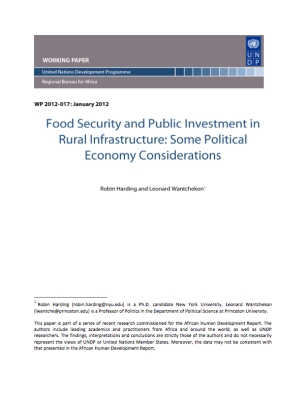Food Security and Public Investment in Rural Infrastructure: Some Political Economy Considerations

Food Security and Public Investment in Rural Infrastructure: Some Political Economy Considerations
April 1, 2013
This paper investigates the political determinants of food security in West Africa. More specifically, we study the relationship between political marginalization, public investment in transport infrastructure, and food security in Benin, Ghana, Mali and Senegal, in order to trace a potential mechanism by which political marginalization impacts upon food security. Our first step is to investigate the determinants of food security. Using data on stunted children, we show that the density of roads per square kilometer has a significant relationship to food security. This relationship holds when we control for other factors known to affect food security, including climate and land productivity. Following this, we then look at the factors that determine the presence of roads. As might be expected, we find that the economic importance of an area is significantly related to the density of roads in that location. In addition to this, however, we find strong support for the argument that political factors also affect the location of roads. Specifically, we find that politically marginalized areas have significantly fewer roads. These findings support our claim that political marginalization indirectly affects food security, by undermining the quality of transport infrastructure.

 Locations
Locations